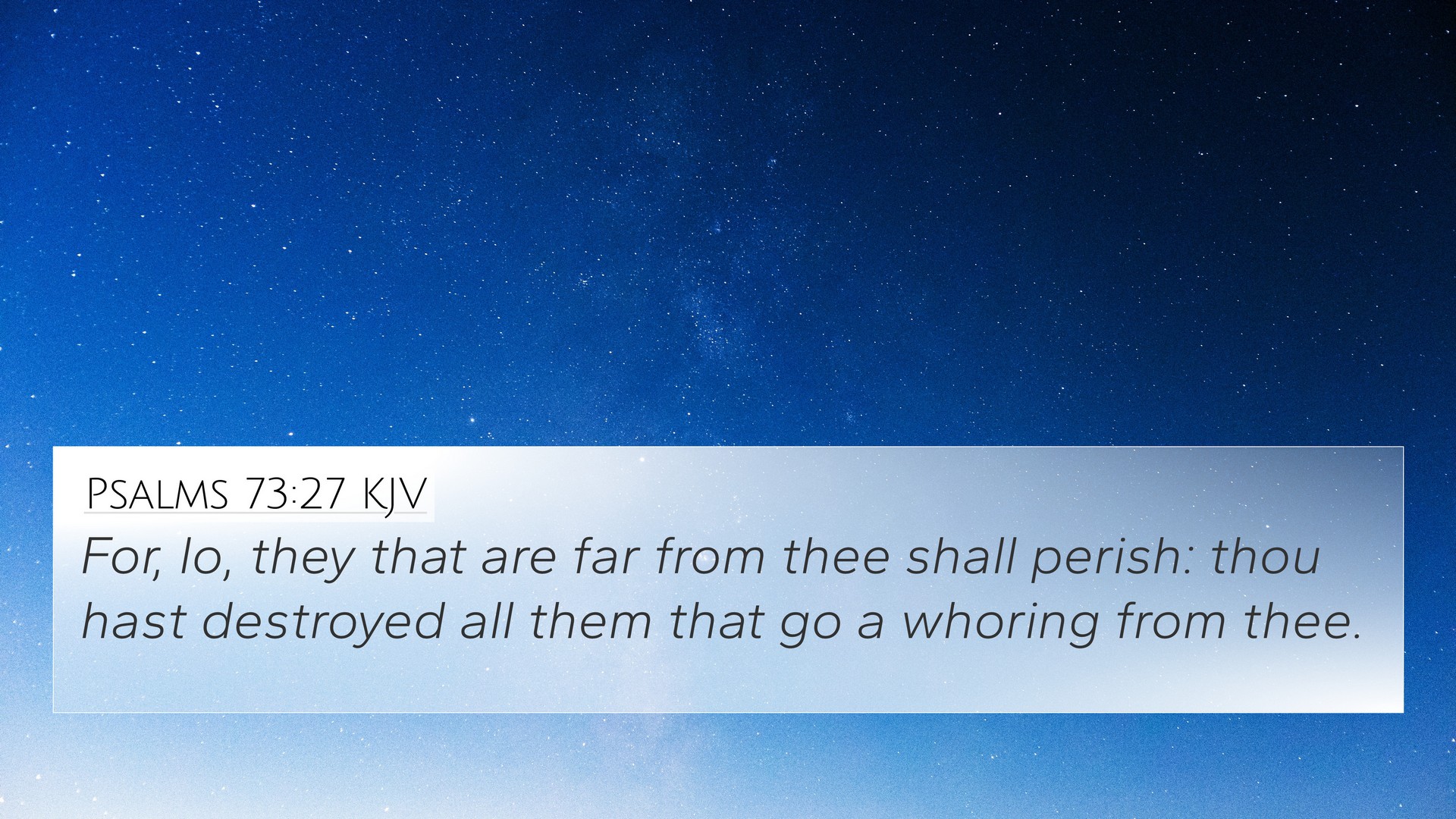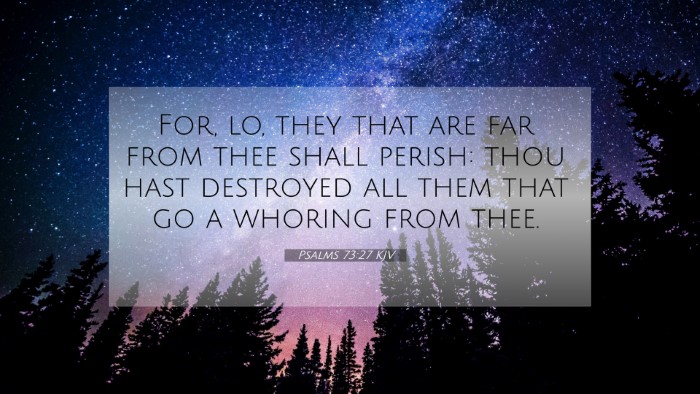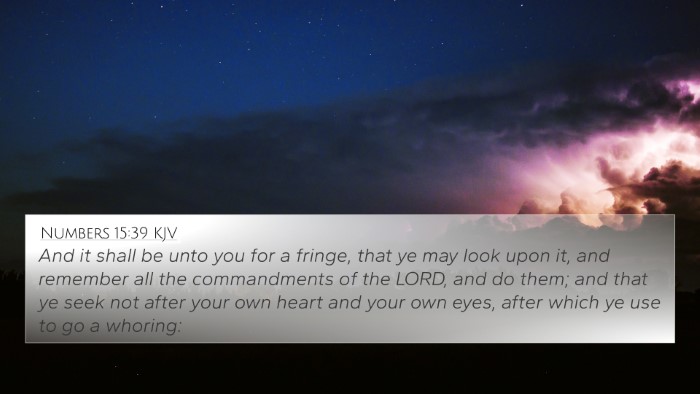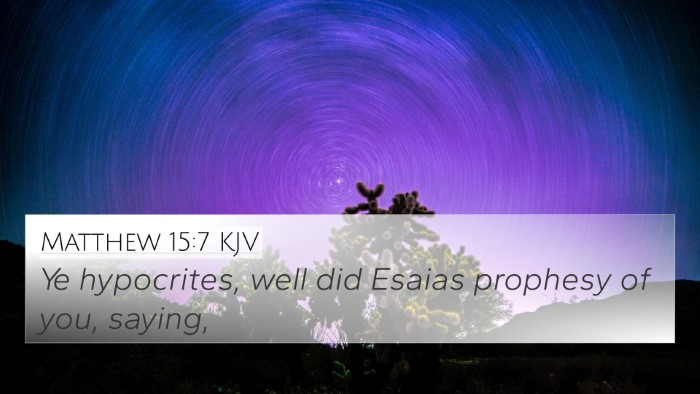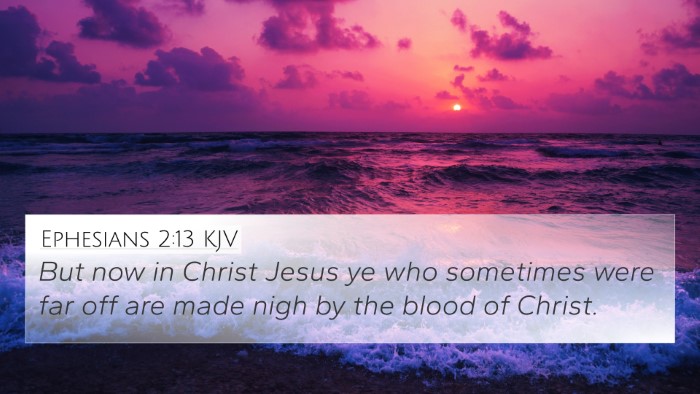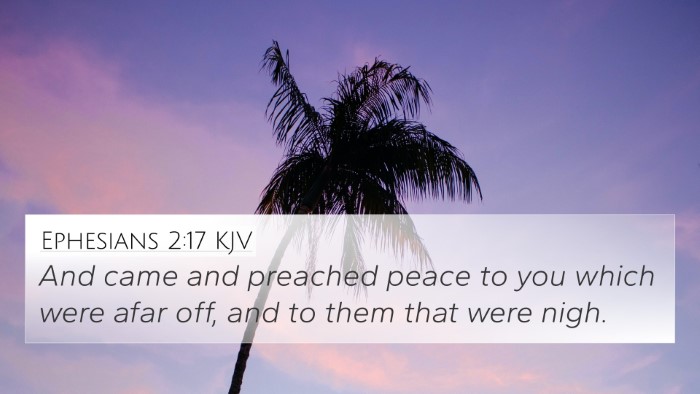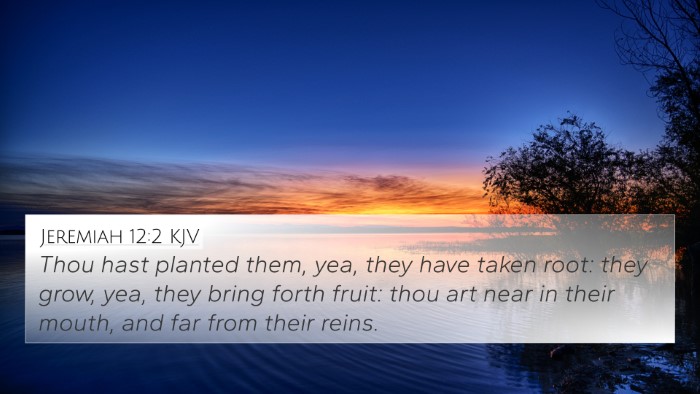Psalms 73:27 - Meaning and Interpretation
Bible Verse: Psalms 73:27 - "For, lo, they that are far from thee shall perish: thou hast destroyed all them that go a whoring from thee."
This verse from Psalms presents a stark reminder of the consequences of turning away from God. Here, the psalmist emphasizes the fate of those who distance themselves from the divine presence, illustrating a central biblical theme of the consequences of sin and the importance of faithfulness to God.
Summary of Commentary Insights
Matthew Henry: Henry notes that this verse serves as a warning about the perils of straying from God. He emphasizes that those who are far from God experience destruction, highlighting that separation from the divine is not just about physical distance but also spiritual alienation. This serves as a powerful reminder that true fulfillment and life are found in communion with God.
Albert Barnes: Barnes elaborates on the notion of "perishing" as a comprehensive term that includes both physical and spiritual demise. He stresses that the ultimate fate of the wicked is destruction, which reflects God's judgment on those who refuse to return to Him. He draws a contrast between the security found in God and the dire consequences awaiting those who abandon His ways.
Adam Clarke: Clarke adds depth to the understanding of “going a whoring,” illustrating the metaphor of spiritual adultery. He implies that turning to idols or sinful lifestyles is akin to infidelity against God. Clarke underscores the ultimate ruin that befalls those who break their covenant with the Lord, reinforcing the call to fidelity in one’s relationship with God.
Cross References and Thematic Connections
This verse connects with various other scripture passages that reinforce its message. Here are 9 relevant cross-references:
- Psalms 1:6: "For the Lord knows the way of the righteous, but the way of the wicked will perish." - Emphasizes the fate of the righteous versus the wicked.
- Proverbs 14:32: "The wicked is driven away in his wickedness: but the righteous hath hope in his death." - A parallel to the outcomes of righteousness versus wickedness.
- Isaiah 57:21: "There is no peace, saith my God, to the wicked." - Highlights the lack of peace for those who turn away from God.
- Romans 6:23: "For the wages of sin is death; but the gift of God is eternal life through Jesus Christ our Lord." - Connects sin and its ultimate consequences.
- Hebrews 10:31: "It is a fearful thing to fall into the hands of the living God." - A warning about the seriousness of judgment.
- James 4:8: "Draw near to God, and he will draw near to you." - Encourages believers to approach God rather than stray.
- Jeremiah 17:5: "Cursed is the man who trusts in man and makes flesh his strength, whose heart turns away from the Lord." - Echo of the consequences of turning away from God.
- Ezekiel 18:30: "Therefore I will judge you, O house of Israel, every one according to his ways, saith the Lord God. Repent, and turn yourselves from all your offenses; so iniquity shall not be your ruin." - Calls for repentance and warns of the consequences of iniquity.
- 2 Thessalonians 1:9: "Who shall be punished with everlasting destruction from the presence of the Lord, and from the glory of his power." - Discusses the ultimate fate awaiting those who reject God.
Inter-Biblical Dialogue
The connections between this verse and others highlight a repeated biblical theme: the dichotomy between righteousness and unrighteousness. Many passages throughout both the Old and New Testaments provide a framework for understanding God's justice and the consequences of sin:
- Thematic Bible verse connections: The consistent biblical narrative warns against the perils of sin and reinforces the need for repentance and a relationship with God.
- Bible verse parallels: Exploring verses like Matthew 7:13-14, where Jesus speaks of the narrow gate, can illuminate the contrast between pathways leading to life versus destruction.
- Comparative Bible verse analysis: Comparing Psalms 73:27 with Proverbs emphasizes wisdom literature’s perspective on the outcomes of life choices.
- Inter-Biblical dialogue: The discussions between the prophets and New Testament writers reveal an ongoing dialogue about faithfulness to God.
Tools for Bible Cross-Referencing
Understanding the interconnections within scripture can be greatly enhanced by utilizing Bible concordance and Bible cross-reference guide. Such tools simplify the process of exploring related verses and themes, allowing for a richer study experience.
In studying the Bible, employing cross-referencing Bible study methods can also aid in identifying how various scriptures address similar themes, such as divine judgment, redemption, and the characteristics of God’s people.
Conclusion
Psalms 73:27 serves as a poignant reminder of the consequences of turning away from the Lord. By exploring this verse alongside its various cross-references, one can gain a deeper understanding of the biblical message regarding obedience, faithfulness, and the inevitable outcomes of sin. This verse and its connections challenge believers to assess their relationship with God and to seek a life that honors Him, emphasizing the importance of staying rooted in faith to avoid the perils of spiritual distance.
